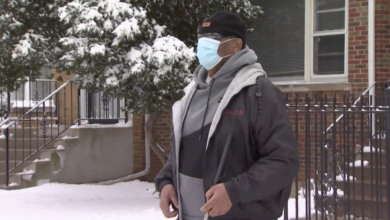
Dr. Scott E. Hadland
As the defense makes its case at former Minneapolis police officer Derek Chauvin's trial for the death of George Floyd, what troubles me most from the shocking video footage is Chauvin’s apparent nonchalance — his calm facial expression, his hand in his pocket, his irreverence toward Floyd’s pleas and onlookers crying out for him to stop. To me and so many others, the discordance between Chauvin’s casual demeanor and his deadly chokehold reflect the dehumanization of Black people in America.
This dehumanization has taken on a new form during the trial — this time, in the form of devaluing people who use substances. As an addiction doctor, I want to put George Floyd’s drug use in context and be clear about how this part of his story is being harmfully exploited.
Floyd’s autopsy report revealed that he had the highly potent opioid fentanyl in his system at the time of death. People seeking to vindicate Chauvin quickly seized on this information. The explicit claim? Floyd died of an overdose. The implicit message? People who use drugs deserve what happens to them.
I am not a medical examiner but, like the medical experts who testified, I have strong doubts that George Floyd died of an overdose. Occam’s razor — that is, the simplest explanation is the most likely — suggests that the knee forcefully occluding Floyd’s neck was the proximal cause of death.
Suzette Hackney:Despair is real among Black Americans as police 'mistakes' persist

Fentanyl is eliminated from the body over up to three days, making it difficult to pinpoint the exact timing of his last use. Overdoses happen quickly (over seconds) and silently. Asphyxiation happens over minutes and matches the time frame of Floyd’s death and his calls for help.
The story behind Floyd’s fentanyl use is a common one. His girlfriend testified that they both struggled with opioid addiction. They first used pills prescribed for pain, and when their supply ran out, they began using other opioids. In many places, heroin and fentanyl are cheap, highly potent, and readily available alternatives to prescription opioids. Indeed, many pills sold on the street (including in Minneapolis) are counterfeits laced with fentanyl.

Yet it is unsurprising that Floyd’s substance use would be used to vilify him. Our society has long viewed addiction as a moral failing. George Floyd was one of the 2.4 million Americans living with opioid addiction each year, the majority of whom do not receive treatment. We addiction doctors watch powerlessly as our patients — particularly people of color — are incarcerated for drug possession and selling (which many do simply to survive) when what they need is treatment.
Once in prison, only 1 in 20 people with opioid addiction receives treatment. On release, the risk of death is nearly 13 times that of the general population.
Patti Davis: I understand Hunter Biden's darkness of addiction. Don't judge us.
That America permits such disastrous health outcomes reflects our values. In a 2018 survey, 55% of Americans supported a "crackdown" on people who use substances.Fewer than 1 in 5 were willing to befriend someone with addiction. The latest data shows that during the 12-month period ending last August, fatal drug overdoses climbed 25%, reaching an unprecedented 85,516 deaths. We are tacitly comfortable with people with addiction being imprisoned and dying.
Floyd is worthy of our compassion
Chauvin's defense lawyer has brought up Floyd's addiction and suggested the possibility of an overdose, signaling he intends to capitalize on our stigma. And in fact the defense started right off Tuesday with testimony on Floyd's drug-related arrest in 2019. The question of whether Chauvin intentionally or recklessly caused Floyd’s death will be obfuscated by discussion of Floyd’s addiction history. The unstated messages will be that he used drugs, that he engaged in amoral behavior, that he was less than human, that his death is undeserving of justice.
How should we instead interpret Floyd’s substance use? Understand that his addiction was a chronic medical condition that, like diabetes or depression, is marked by periods of relapse and remission, but that we can be hopeful because recovery is not only possible but common. Understand that Floyd and his girlfriend repeatedly sought treatment, but the quality of our nation’s addiction treatment remains abysmally poor in most settings and our system failed them, not the other way around. Understand that people of color are disproportionately shunted to prisons rather than treatment when they use substances.
Hate in America:Caron Nazario case shows hate is an American disease, not just a white one
Most important, remember that George Floyd was, like all of us, worthy of our compassion — not despite his substance use, but perhaps even more so because of it. One of the greatest gifts of the #BlackLivesMatter movement is that it has reminded us that every unarmed Black person killed by the police is someone’s father, sister, grandson, aunt. So, too, are people across America who live with addiction. They, and George Floyd in life and death, deserve to be treated with dignity.
Dr. Scott E. Hadland is an addiction specialist at Boston Medical Center and associate professor of pediatrics at Boston University School of Medicine. Follow him on Twitter: @DrScottHadland









